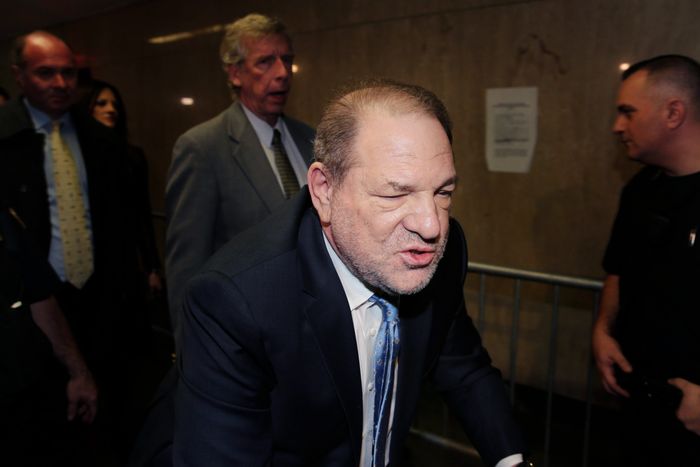
A Manhattan judge sentenced Harvey Weinstein to 23 years in prison for rape and sexual assault on Wednesday. Weinstein was found guilty of two counts on February 24 — criminal sexual act in the first degree, and rape in the third degree — following a nearly seven-week trial. Weinstein’s conviction was for two attacks: forcibly performing oral sex on former Project Runway production assistant Mimi Haleyi at his Soho apartment in 2006, and raping aspiring actress Jessica Mann at a Midtown East hotel in 2013. Justice James Burke, who oversaw Weinstein’s case, said at the sentencing, “I will say that although this is a first conviction, it is not a first offense.” Burke also ordered Weinstein to register as a sex offender.
Weinstein, who had been charged with a total of five counts, was found not guilty of three: one count of first-degree rape involving Mann, and two counts of predatory sexual assault. The predatory-sexual-assault counts included Sopranos actress Annabella Sciorra’s allegation that Weinstein raped her around late 1993. The verdict means that Weinstein was not convicted of a charge involving Sciorra.
Weinstein’s conviction doesn’t mean his legal drama has ended. Vulture spoke with attorneys about what’s next for the fallen producer-turned-convicted rapist.
Weinstein is now in prison.
The convicted rapist was transferred from New York City’s Rikers Island jail to the Wende Correctional Facility, a maximum-security state prison near Buffalo, on March 18. Less than one week after his arrival, Weinstein reportedly tested positive for coronavirus. Weinstein’s time in federal custody has been characterized from drama from the start. He bounced between Bellevue Hospital, where he was treated for chest pains, and Rikers before his eventual transfer Upstate.
Weinstein was supposed to have the same intake process of any new state prisoner, though it’s unclear if his reported coronavirus inefection changed that. New state prison inmates are typically taken to a “reception center,” at a facility, where they are “required to receive a shower and delousing treatment.” They are also “required to receive a shave and a haircut,” a New York State Department of Corrections and Community Supervision document states. Inmates are also supposed to get a pamphlet, The Prevention of Sexual Abuse in Prison; What Inmates Need to Know, and watch a “gender-specific version of the film Ending Sexual Abuse Behind the Walls; An Orientation.”
Weinstein still has a criminal case in Los Angeles.
One day before jury selection in Weinstein’s Manhattan trial started, the Los Angeles County District Attorney’s Office announced charges of rape and sexual assault against him. The four counts involve two separate women over a two-day period seven years ago. Weinstein was charged with one count each of forcible rape, forcible oral copulation, and sexual penetration by use of force for allegedly pushing his way into a woman’s hotel room on February 18, 2013, and raping her. Weinstein was charged with one count of sexual battery by restraint for allegedly trapping actress Lauren Young in the bathroom of his hotel suite and groping her breast on February 19 of that year. (Young actually testified at Weinstein’s trial as one of the three witnesses attesting to prior, uncharged “bad acts.”)
Los Angeles prosecutors said on January 6 that they were investigating eight allegations against Weinstein. Three of those accusations were outside the statute of limitations and can’t be pursued, but prosecutors said at the time that they were continuing their investigation into the other three. Weinstein has not yet been arraigned in his California criminal case. A spokesman for the L.A. district attorney said in an email that “Mr. Weinstein would not be brought back to Los Angeles until after he was sentenced.” After Weinstein’s conviction was revealed Monday, Los Angeles prosecutor Paul Thompson said, “We are definitely proceeding.”
Weinstein will be brought to L.A.
Two-and-a-half hours after Weinstein’s sentence came down, prosecutors there gave a quick update on their case, saying in a press release, “The Los Angeles County District Attorney’s Office has begun the process of extraditing defendant Weinstein to California to face the sexual assault charges that were filed in January.”
L.A. prosecutors said in a March 23 press release that the office “initiated its request to New York for the temporary custody of defendant Weinstein… to bring him to Los Angeles County to face rape and sexual assault charges.”
The prosecutors said they “cannot determine when defendant Weinstein will physically be in Los Angeles.” Prosecutors there also discussed coronavirus concerns in their statement.
“As for any concerns given the coronavirus pandemic, our office expects that each agency responsible for processing, transporting and housing defendant Weinstein will follow its protocols and public health guidelines,” the prosecutors’ statement said.
Defense lawyer Julie Rendelman said that typically, papers would be filed to bring Weinstein to California to face these charges. Weinstein can “waive extradition,” which basically means not fight it, or he can oppose being brought there. If Weinstein does want to fight extradition, there would be a hearing.
“I think he’d prefer, in a sense, to go to California,” Rendelman said. “I think the prison system may be somewhat better for him there.” If Weinstein is extradited, he could stay in jail there until that case starts, though “they could technically bring him each time there’s a hearing, or a court date in L.A., and then bring him back, but that doesn’t seem to be a logical decision.” Rendelman pointed to Weinstein’s health issues, and said his L.A. lawyer would want him there, “because they’re going to need to speak to him regarding his defense.” If Weinstein were convicted in the L.A. case, he would likely return to New York to serve out the rest of the sentence in his Manhattan case.
Weinstein’s conviction might impact his L.A. case — but not necessarily.
Defense lawyer Julie Rendelman pointed to the fact that one of the women who accused Weinstein of misconduct in New York is part of his Los Angeles case in explaining why there could be a potential impact. “This may give LA a bit more confidence in going forward with their case, particularly regarding that complainant,” Rendelman told Vulture in an email. “Further, it would create the possibility, although highly unlikely, that Weinstein might plead in LA to hope for a lighter sentence, given his conviction in NY.”
Rebecca Roiphe, a New York Law School professor and former assistant district attorney in Manhattan, said that “there’s no way in which his indictment should legally affect the outcome of the case in Los Angeles, because it’s a different set of facts, and different laws, so there’s no direct legal impact … That said, it’s hard to imagine that the conviction, and the press surrounding the conviction, hasn’t affected the impression of the public, and therefore, the preconceptions of the future jurors in Los Angeles.”
Weinstein can appeal his conviction.
Weinstein’s lawyers said they plan to appeal his conviction, with a state appeals court called the Appellate Division, First Judicial Department. Following Weinstein’s sentencing, his legal team said they expect to file paperwork as early as July.
Weinstein’s appeal is a complicated process.
After Weinstein is sentenced, his lawyers have 30 days to file a notice of appeal — basically, a formal heads-up that they are going to fight the outcome — with a state appeals court. Following that notice, they have 120 days to file an “appeal brief” — their fleshed-out argument for appeal — though the appeals court can give them an extension, Richman said.
Weinstein’s lawyers can ask for several things, said defense attorney Rhiya Trivedi. They could ask for the appeals panel to reduce his sentence. They can also ask for the appeals court to kick sentencing back to Burke if they found that his sentence didn’t jibe with sentencing law. Weinstein’s legal team could also ask the appeals court to throw out the conviction and order a new trial. (This basically puts everything back at square one, so it could mean a new trial, or possibly that Weinstein would decide to take a plea.) They could also ask for the indictment against Weinstein to be dismissed outright.
If the outcome isn’t in his favor, Weinstein can try taking his case to a higher state appeals court.
Weinstein still faces civil lawsuits.
While the controversial $25 million settlement that would end many sexual-misconduct lawsuits against him isn’t yet finalized, Weinstein’s conviction wouldn’t prevent this deal from going forward. Under this tentative settlement, $6.2 million would be for 18 accusers who had filed cases in the United States, the United Kingdom, and Canada, and the rest of this money would be for class-action participants and accusers who have not come forward. Some Weinstein accusers rejected participating in this settlement and are going forward with their own lawsuits; his conviction won’t stand in the way of that litigation. Roiphe also said that the criminal conviction will make it easier for women to sue.
“I don’t think there’s any effect, from the standpoint of proceeding,” said Douglas Wigdor, who represents three women who have civil claims against Weinstein. “You have to go up to where they’re being held in prison. We’ll go wherever he is and take his deposition.”
Weinstein’s conviction and potential imprisonment shouldn’t impact any money he might have to pay accusers, Wigdor added. “I don’t know why prison would affect his money. I assume he has a great deal of money.” Weinstein “actually saves more money” by being in custody and “not out spending it,” Wigdor said.
If lawsuits against Weinstein went to trial, he could attend if he wanted to, but he would not be required to appear in court.


